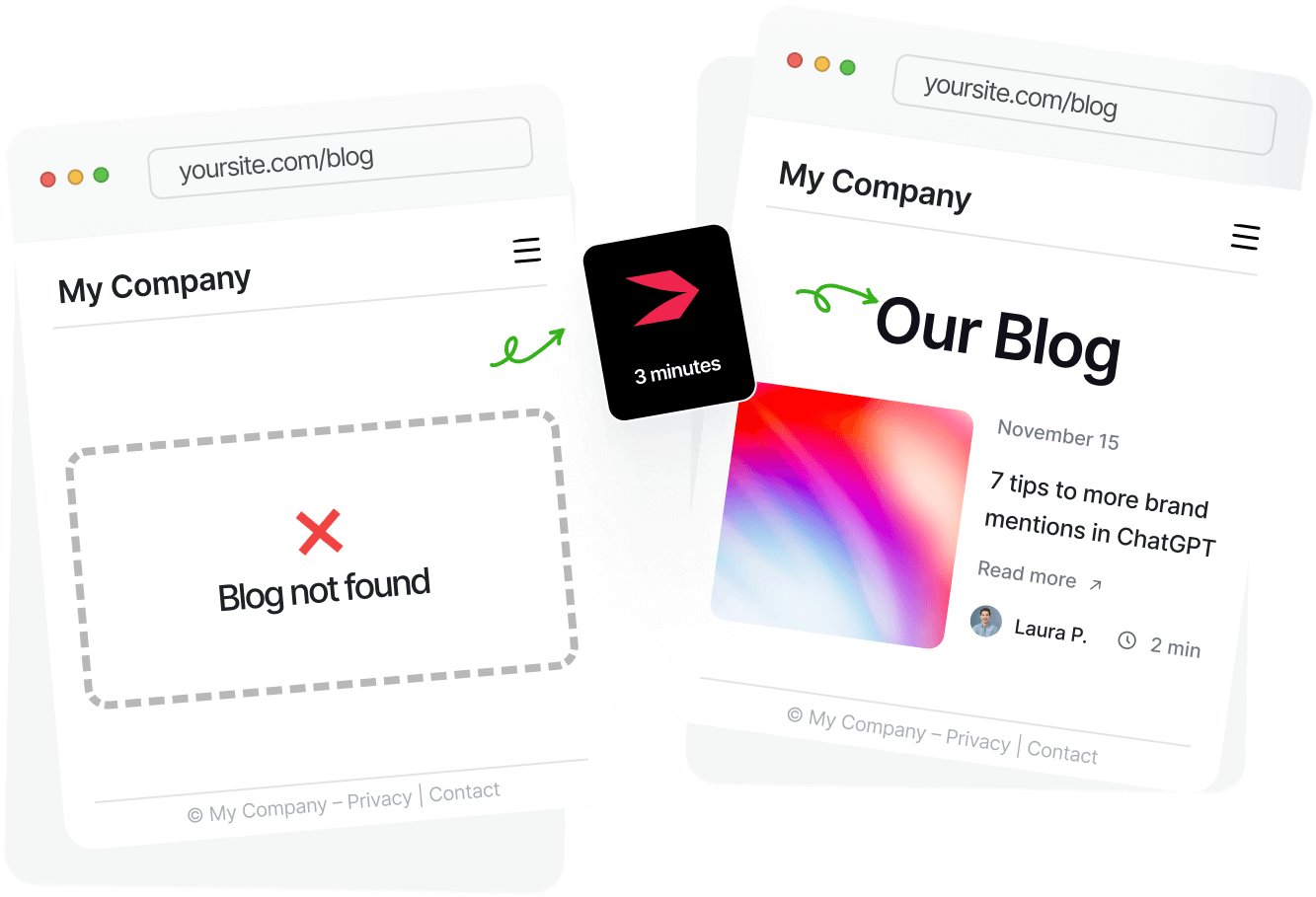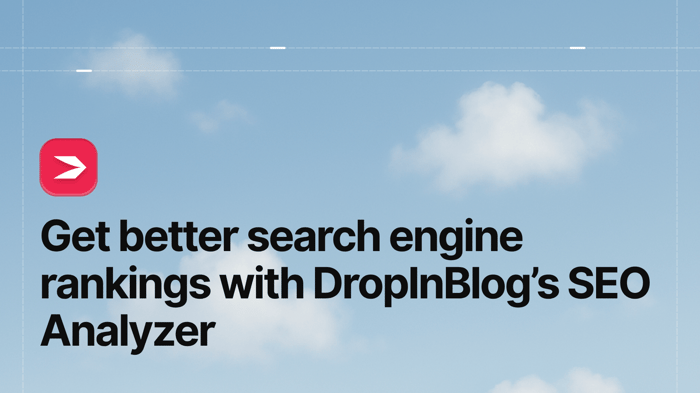Weebly vs. Yola is a fair comparison. Both web platforms fall within the category of site builders, offer a visual editor, have a variety of e-commerce functionalities, and allow you to create an online store. In addition, they were both founded in the same year: 2007.
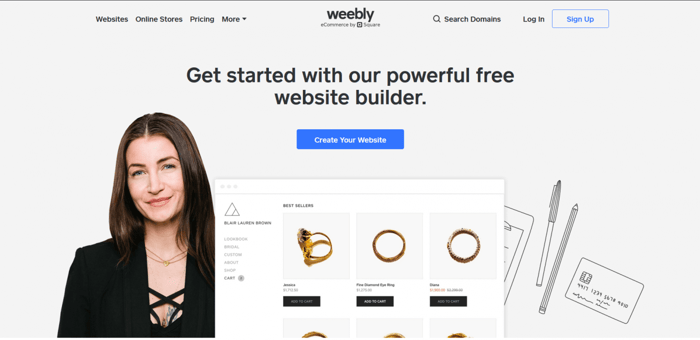
It doesn’t take much research to learn that today’s market is full of site builders and e-commerce platforms, yet finding the right one can be a challenge. However, if you are considering Weebly or Yola or you want to learn something more about these platforms, we can help you.

In this Weebly vs. Yola comparison, we’ll explore these two platforms and talk about pricing, features, editors, blogging, and customer support.
| A quick comparison: | ||
| Weebly | Yola | |
| Pricing |
|
|
| Editors |
|
|
| Features |
|
|
| Customer support |
|
|
Table of Contents
Pricing
Weebly
Weebly and Square
Before we go any deeper into Weebly, there’s one crucial thing you need to know about this site-building software. In 2018, Weebly became part of Square. Square is a prominent finance and payment processing platform that bought Weebly to expand its field of activity to the realm of e-commerce.
The acquisition brought a wide array of changes to Weebly, and there are a couple of things to keep in mind. As a result of this merger of sorts, it’s important to be aware of the following:
- Signing up for Weebly now means you’re signing up for Square as well. One of the outcomes is that your admin dashboard is the Square admin dashboard, but you can still access the Weebly builder.
- The Square pricing system has influenced the Weebly pricing system in both the number of plans and the plans’ features.
Overview
The Weebly pricing system comprises one free and three paid pricing plans. Weebly’s official website provides information on the free account and three paid pricing plans:
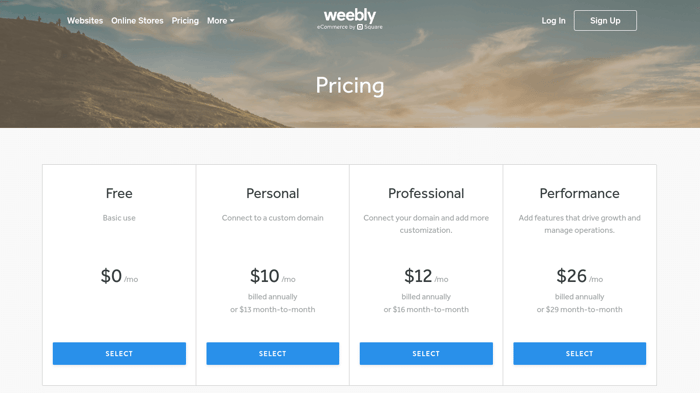
From the image, we can see that there are two billing options: monthly and annual. Like any other case, annual billing is always more cost-effective than monthly payments in the long run.
Features
Now, let’s have a look at some of the unique features you’ll get with each plan.
The Free Plan:
- 500 MB storage space
- Free domain name that contains the Weebly subdomain weeblysite.com
- Ability to add third-party embed code
- Payments through Square or other payment options, such as Google Pay and Apple Pay
- E-commerce toolkit (shopping cart, item options, inventory management, and an automatic tax calculator)
- SEO tools
- Lead capture forms
The Personal Plan:
- Ability to connect a custom domain
- Ability to sell digital goods
- Shipping calculator
- Shipping labels
- Pop-up notifications
The Professional Plan:
- Unlimited bandwidth and storage
- Removal of Square ads and footer
- Password-protected pages
- Advanced website statistics
The Performance Plan:
- Abandoned cart recovery
- Possibility of integrating PayPal
- Product/item reviews
- Advanced e-commerce stats
Yola
Overview
The Yola pricing system consists of eight different packages: four full-blown website plans and four online store add-ons. There’s a free plan available with both the website plans and the online store add-ons.
Keep in mind that the online store add-on fees are paid on top of the website plan fees. You can pay for a monthly or an annual subscription, but note that you can only select the annual subscription for an online store add-on if you also have an annual website plan subscription.
As Yola offers a free website plan and one free online store add-on, this is a fantastic opportunity for anyone who’d like to kick the tires of the platform without having to commit to a high upfront cost. In addition, you’re then able to test out the platform as long as you like before deciding on the subscription plan most suitable for you.
This is the basic information about the website plans:
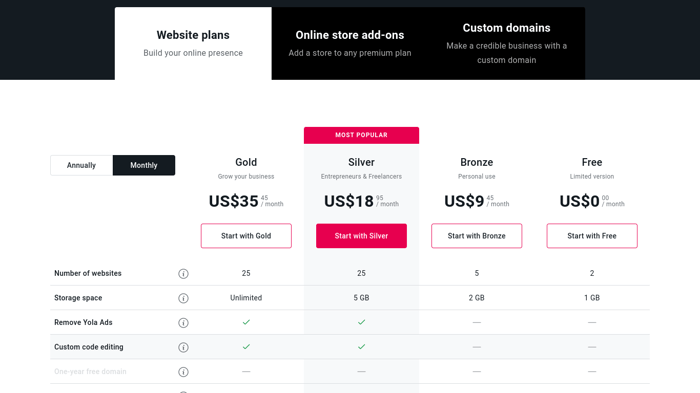
As always, there are discounts on annual subscriptions. With the discounts, the annual fees work out to $5.91/month (Bronze), $14.00/month (Silver), and $26.00/month (Gold).
With the online store add-ons, Yola offers a lot in terms of e-commerce functionality, which also raises the price. Speaking of which, the following are the monthly fees for online store add-ons:
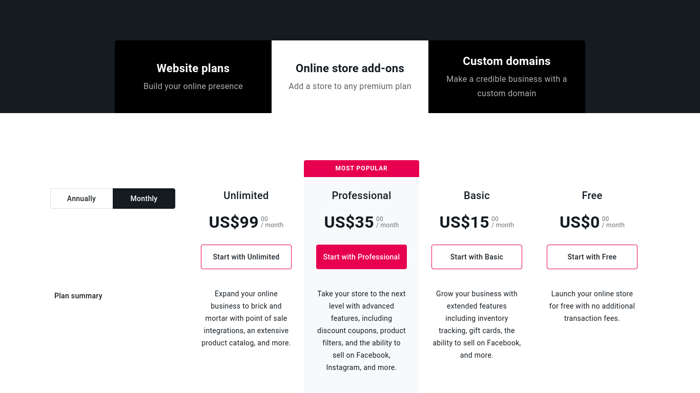
With the annual subscription discounts, the prices would be $12.50/month (Basic), $29.17/month (Professional), and $82.50/month (Unlimited).
Online Store Add-Ons and E-Commerce Features
Since the key features of each plan can be seen in the first image in the previous section, we’ll concentrate only on the online store add-ons here.
Yola offers a lot of e-commerce features, with the following being some of the more notable ones:
The Free Add-On:
- Maximum of three products
- Ability to sell on Google Shopping and Facebook
- Product options/variants (size, color, etc.)
- Google Universal Analytics, Facebook Pixel, and other tracking & reporting tools
- PayPal, Square, and offline payments
The Basic Add-On:
- 100 products and 10,000 categories
- Sale of digital goods (e-books, music, videos, images, and similar) up to 100 MB
- Promotional pricing
- Android and iOS Yola apps for store management
- Over 30 additional payment methods
The Professional Add-On:
- 2,500 products
- Automated email marketing
- Automated abandoned cart recovery
- Subscription sales
- Multilingual store
The Unlimited Add-On:
- 70,000 products
- Point-of-Sale system
Conclusion
The Yola pricing system resembles the Weebly pricing system very closely, both price-wise and feature-wise. Both platforms are affordable and offer a free plan to gain firsthand experience with their software. The prices are similar, and – from a bird’s eye view – there’s not much that separates them.
When it comes to e-commerce capabilities, Yola offers a lot of them, so higher prices are not unexpected. However, keep in mind that Weebly is now part of Square’s extensive software and hardware tools ecosystem.
That means that, unlike when it was a standalone platform, thanks to Weebly’s integration with Square you now have greater e-commerce functionality. More importantly, you can get it at prices lower than what Yola offers.
Editors
Weebly and Square Online
Square provides its customers with two site builders, depending on whether they choose the “business website” or the “personal website” option when creating a Weebly (Square) account. Selecting the first one means you’ll be sent to Square Online – Square’s own e-commerce site builder built using the Weebly software.
In contrast, selecting the second option allows you to use the Weebly builder.
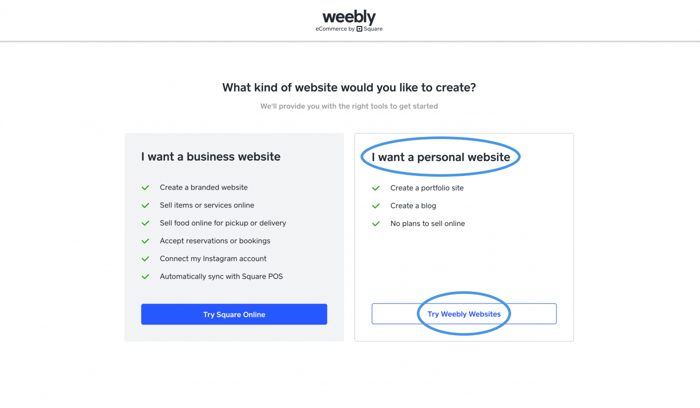
We cannot emphasize enough how important it is to make sure to click “Try Weebly Websites” if you’re really after Weebly. The Square Online editor is an entirely different environment, so you should opt for it only if Weebly is not the specific builder you want.
The Weebly Editor
Of the two editors provided by Weebly, in our opinion, the Weebly website editor is the better one. It’s a typical drag-and-drop editor, which means it’s easy to use and intuitive. Contrary to what it implies when it says, “I want a personal website,” it allows you to create and edit all kinds of websites: personal, portfolio, standard, and e-commerce (online store).
This is how it looks when you start editing your site:
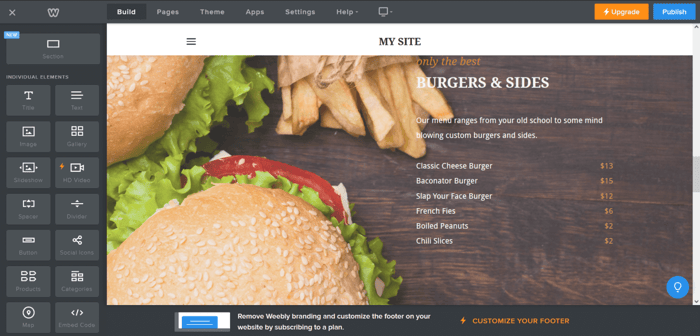
You can add a section or any of the individual elements you see on the left side by dragging and dropping on a certain part of the page. By the way, what you see in the image above is only a fraction of the element types available.
Editing an element in the site editor is pretty easy. Just like in any other editor of this type, simply click the part of the page you want to modify, and the editor will show you the available customization options.
In addition to this, you can use the code editor accessible through the Weebly builder to add custom HTML, CSS, and JavaScript code and make advanced edits to your website.
The Square Online Editor
Your Square account gives you access to both the Weebly and the Square Online builders. If you choose “Try Weebly Websites,” you can enjoy the perks of both. In contrast, if you select “Try Square Online,” you’ll have no choice but to use Square Online exclusively.
Since you have the ability to switch between builders, we feel obliged to say a few words on the Square Online editor. The Square Online editor is a visual editor, but it’s not drag-and-drop, so it doesn’t feel as intuitive as the Weebly editor.
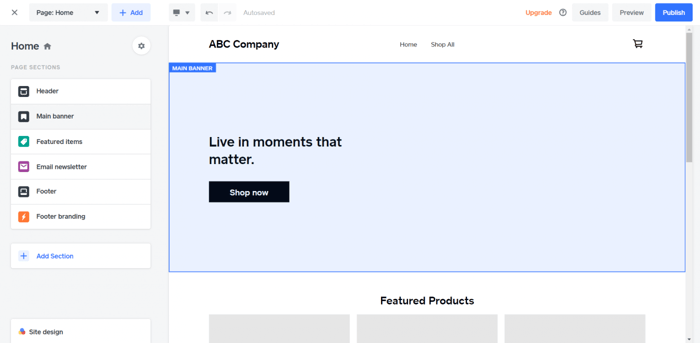
These are some of the things you can do in the Square Online editor:
- Move through different sections by mousing over the name of the section in the left sidebar.
- Rearrange existing sections and add new sections.
- Add pages, sections, and categories.
- Preview your store on a desktop and mobile device.
- Change the design by customizing colors, fonts, and buttons.
Yola
In a somewhat similar way, Yola offers two different editors: a site editor and an online store editor. If you’re building an e-commerce store, you’ll need to use the online store editor at some point.
It should be noted that Yola has upgraded its editor to Sitebuilder+. All new accounts will automatically be using the new Sitebuilder+ editor, while existing customers can continue to use Sitebuilder Classic if they wish.
The Yola Site Editor
The Yola site editor is simple, intuitive, and easy to use. It will even give you tips on how to edit your page template. When you open your site in the Yola Sitebuilder+ editor, you’ll see something like this:
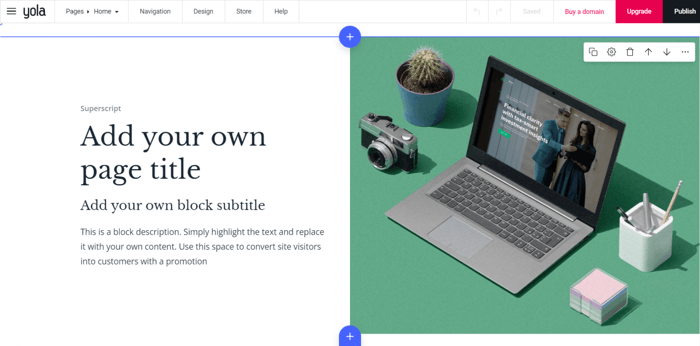
You can add new content blocks by clicking the plus signs and edit your pages by clicking the parts you want to modify. The editing process can be pretty easy and quick, but this comes at the expense of customization options. Anyway, if you're looking for simplicity, the Yola site editor is as simple as they come.
The Yola Online Store Editor
Building a store with Yola is certainly not as straightforward. We wouldn’t describe it as difficult, but overall it’s not as simple as building a regular website due to the more complex nature of online stores in general. This is the Yola online store editor in action:
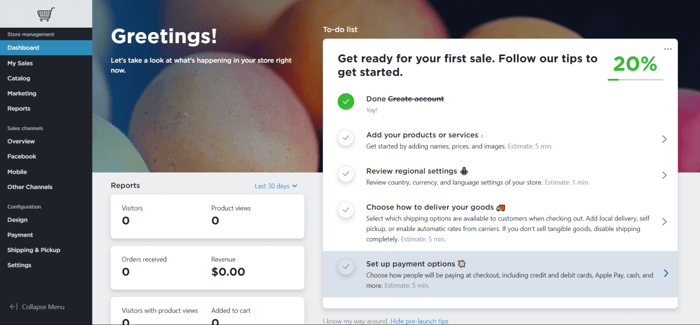
There’s a lot you can do in it:
- Edit orders
- See abandoned carts
- Track customers
- Add and edit products
- See analytics and reports related to your store
- Add multiple sales channels
- Customize the design of your store
- Add payment methods and processors
Despite not being as straightforward as the site editor, it’s still possible to get your head around the Yola online store editor and use it efficiently without needing to bring in a developer.
Blog
Weebly
Weebly offers two possibilities: create a blogging site or add a blog to your existing site. If you want to create a blogging website, you can choose from eight free blog templates that Weebly offers:
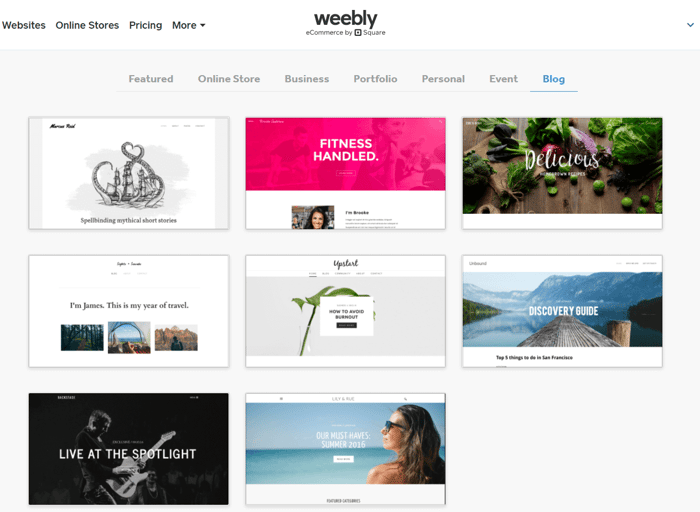
If you’re building a website for other purposes, blogging with Weebly is as easy as just adding a new blog page:
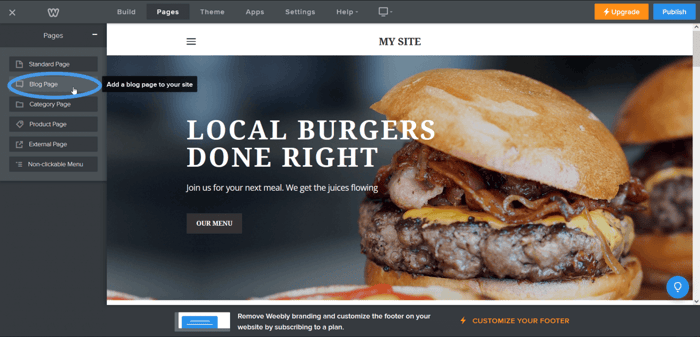
Weebly allows you to set various options related to your blog:
- Create a draft
- Add a header
- Adjust visibility: public or limited access depending on the type of user or whether they have the necessary login information
- Adjust SEO settings: page title, permalink, description, meta keywords, and 301 redirects
- Add a cookie notification
- Add Google AdSense or an alternative
- Add a share button for posts
- Allow comments
In order to create a new blog post, you’ll need to first drag and drop a new text element from the menu on the left:
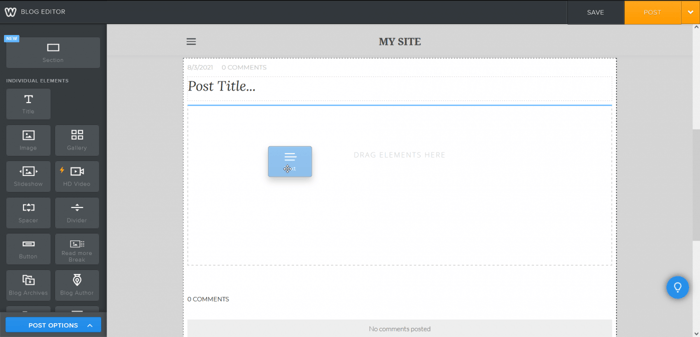
It’s great that Weebly offers a built-in blogging solution. However, keep in mind that Weebly was not built to be a blogging platform, so its native blogging tool may not be exactly what you expect or need.
If you want a better or richer blogging experience, there’s excellent, specialized third-party blogging software that you can add to your Weebly site – it’s that much better.
Yola
If you plan to blog with Yola, but you’re using the new Yola Sitebuilder+ platform, we’re sorry to say that you're out of luck because Yola doesn’t include built-in blogging functionality.
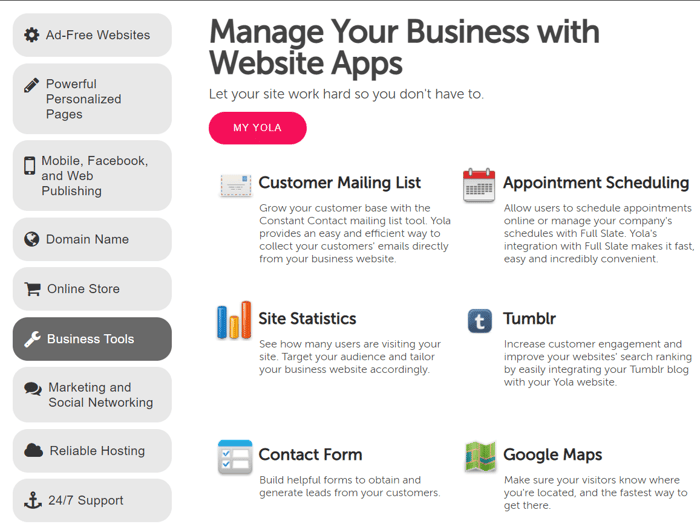
Before the launch of Yola Sitebuilder+, Yola had its own native blogging tool, but it’s not available anymore. Instead, they give you the option to add a Tumblr blog, but this isn’t really the best blogging solution.
It might be suitable for online journals and sharing interesting information, but it’s neither adequate for marketing purposes nor for boosting website traffic. Don’t even get us started on how unprofessional it would look, especially in a business context.
There is always a better option. Luckily, for Yola customers, blogging is possible by integrating the platform with DropInBlog.
DropInBlog is a blogging platform that allows users to build a modern blog quickly and without much effort. There’s no complex configuration and setup. It’s powerful and simple to use. So, if you already own a Yola site and intend to work on improving SEO and attracting more visitors to your site, starting a blog with Yola is an excellent way to do that.
Customer Support
Weebly
Weebly provides email and chat support, as well as phone support, with the higher-tier plans (Professional and Performance). On top of this, Performance subscribers can enjoy the advantages of priority support and get their concerns addressed faster.
You can also find helpful material and useful resources on the Weebly Support page, Weebly Blog, Weebly Community, and Weebly Facebook account.
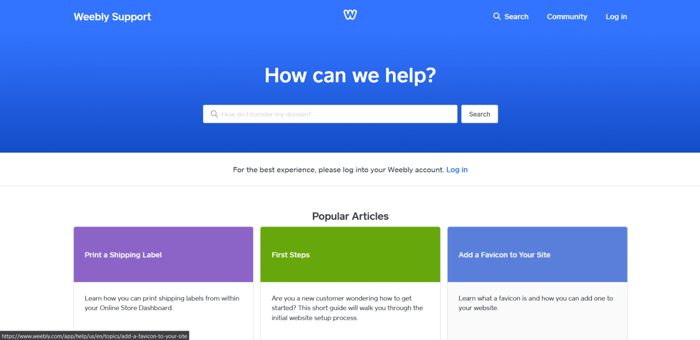
Overall, Weebly’s customer support is pretty good. Most of the time, the support team is up to the task and capable of resolving customer issues.
Yola
When it comes to direct support, Yola offers help to its customers through email. All customers get access to email-based support, but the main difference is response time. Those on the free plan will undoubtedly wait longer, whereas those with a paid plan have 24/7 priority support.
However, email is not the only way to get help from Yola. The Yola Help Center, Yola Blog, and Yola Facebook account are additional resources of valuable information and help.
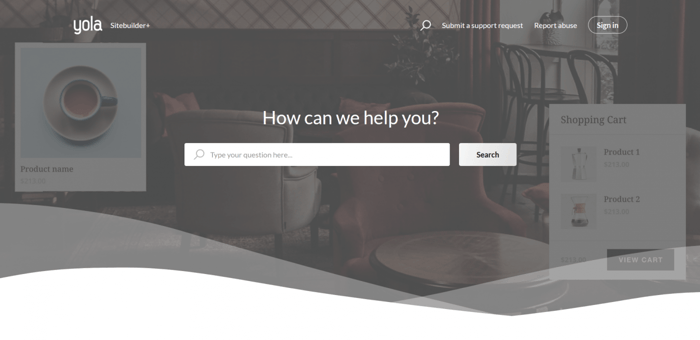
Conclusion
It’s clear that Weebly is a standout winner in terms of customer support. Yola simply doesn’t offer direct help through as many channels as Weebly.
However, keep in mind that the general impressions, experiences, and customer ratings of Yola customer support are favorable, despite the lack of multichannel support.
FAQs
Which is more beginner-friendly, Weebly or Yola?
In this regard, Weebly and Yola are very similar. They both offer a drag-and-drop editor and are designed for simplicity. However, Yola wins by a whisker.
Unless you need the online store builder, which is a little more complicated, the Yola site builder is super simple to use with no unnecessary extra functions that can lead to confusion.
Is Yola more customizable than Weebly?
No, when it comes to customization, Weebly wins. Yola is super easy to use, but that comes at the expense of the ability to deeply customize your site. Weebly offers greater design functionality and a code editor.
Over and Out
Despite being very similar, Weebly and Yola are not equally popular. Based on total monthly visits, Weebly is far more popular than Yola and even more popular than famous site builders like Wix and Squarespace. However, popularity isn’t automatically a strong indicator of quality, so take that information with a grain of salt.
We hope that this Weebly vs. Yola comparison has been helpful for your research into the right site builder for your online ventures. Despite what we’ve said here, we always recommend you test the platform out yourself before making a final decision.
Take advantage of the free plans to explore the platforms’ strengths and weaknesses firsthand, and you’ll be in an excellent position to discern the better option for your online presence and your business.

